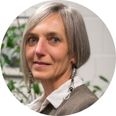LEAD Reverse Mentoring Pair
Divya Sharma and Martine Dunnwald
 Divya Sharma, Reverse Mentor
Divya Sharma, Reverse Mentor
Divya Sharma is a dedicated molecular biologist with over 13 years of comprehensive experience in academic and industry settings, holding a master's degree in molecular biology from Bangalore University, India, and in biochemistry from the University of Lethbridge, Alberta, Canada. Most of her academic research looked into RNA structures, investigating RNA-protein interactions and translation mechanisms concerning virology (Hepatitis B virus and Coxsackie B3 virus) and cancer cells. After being in academics for about five years, Sharma moved to Siemens Healthcare, where she worked on molecular assay development, immunoassays, and sample pre-analytics. Sharma has co-authored multiple peer-reviewed publications and granted patents. Currently, she contributes as a lead research scientist working on sepsis diagnosis at Siemens Healthcare Diagnostics. Besides her love for science, Sharma has been a classical dancer performing at many national and international forums, enjoys gardening, and is a fitness enthusiast.
What new skills do you seek to gain as a reverse mentor?
As an introvert, I want to step out of my comfort zone and engage with people from diverse backgrounds and at different stages of life and career. I also aim to build more confidence in my leadership and develop the ability to mentor individuals who are very different from myself.
How is mentoring important to your career development?
As I take on increasing leadership responsibilities, developing strong networking and mentoring skills is essential for my success. I am eager to seek out opportunities that will help me cultivate and strengthen these capabilities.
How does diversity and inclusivity impact your leadership style?
Diversity and inclusivity play a crucial role in shaping my leadership style by fostering a culture of respect, innovation, and collaboration. Diverse perspectives and creative ideas enrich my approach to problem-solving and decision-making. As the workplace continues to evolve, it has become even easier to collaborate across diverse talents and experiences, enabling teams to achieve the best possible outcomes.
Divya Sharma is a member of Association for Molecular Pathology, a FASEB member society.
 Martine Dunnwald, PhD, Reverse Mentee
Martine Dunnwald, PhD, Reverse Mentee
Martine Dunnwald is a pharmacist from France. She became fascinated with the structure and function of the skin, which led her to pursue a doctorate at Laval University, Quebec City, Canada, focusing on stem cells. After completing a postdoctoral fellowship at the University of Washington, where she studied skin diseases, she joined the University of Iowa in 1999. There, she continued her work on skin stem cells and tissue repair. Currently, Dunnwald is a research professor in the Department of Anatomy and Cell Biology, where she investigates epidermal and orofacial development. She also teaches the anatomical sciences to health professionals. Dunnwald is passionate about mentoring and building communities at the workplace to ensure everyone feels supported and welcome.
Outside of work, she enjoys traveling around the world. She loves spending time outdoors, whether biking, hiking, or camping. A photography enthusiast, she captures moments wherever she goes and always packs her knitting needles. Additionally, Dunnwald enjoys playing and listening to music.
What new skills do you seek to gain as a reverse mentee?
I seek to improve how to communicate efficiently with the current generation and gain language skills adapted to the diverse student population. I am also looking forward to overall feedback on my mentoring style and how I can adapt it to serve this generation of students.
How is mentoring important to your career development?
Mentoring is everything. It’s about people, relationships, and community. We can’t function without it.
How does diversity and inclusivity impact your leadership style?
I want to give everyone a chance and want everyone to feel empowered to say, “Yes, I can.” I value diversity and inclusion as a unique opportunity to learn and embrace different perspectives. My leadership is very much to nudge the unsung heroes and support them to reach their goals.
Martine Dunnwald is a member of American Association for Anatomy, a FASEB member society.